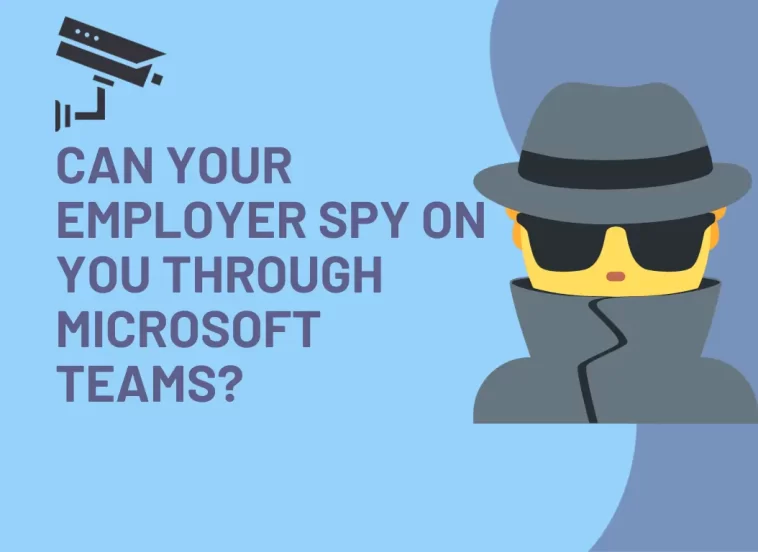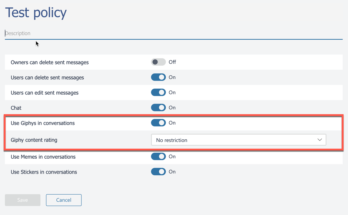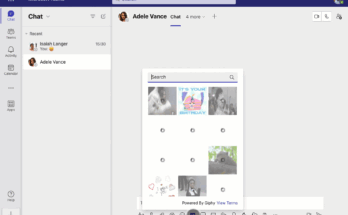No, Microsoft Teams cannot be used to spy on you. Microsoft has implemented strong security measures to protect user privacy.
Microsoft Teams is a secure platform widely used for remote collaboration and communication in businesses and organizations. With its end-to-end encryption and strict privacy policies, Microsoft Teams prioritizes user data protection. While Microsoft may collect user data for analytics, it is not used for spying purposes.
As a result, users can trust that their communications and interactions within Microsoft Teams remain private and secure. This has made Microsoft Teams a popular choice for businesses seeking a reliable and trustworthy platform for online meetings and collaboration.
Privacy Concerns Surrounding Microsoft Teams
As use of Microsoft Teams becomes more widespread, concerns about privacy and data security have been raised. Many users wonder if Microsoft Teams can be used to spy on their activities, leading to questions about the platform’s data collection policies and integration with other Microsoft services.
Data Collection Policies
One of the primary concerns related to privacy on Microsoft Teams revolves around its data collection policies. Microsoft does collect certain data from users to improve the platform’s performance and provide personalized experiences. This includes user-provided data such as communication content, as well as information on how individuals interact with others using Teams. While Microsoft claims to use this data to enhance user experience and security, some worry about the potential for misuse or unauthorized access to this information.
Integration With Other Microsoft Services
Another area of concern is the integration with other Microsoft services. Microsoft Teams is deeply integrated with other Microsoft Office 365 applications, such as Outlook, SharePoint, and OneDrive. While this integration can streamline workflow and collaboration, it also raises questions about data sharing and potential privacy implications. For instance, user data from Teams may be shared with other connected Microsoft services, leading to fears about the cross-platform tracking and surveillance by the company.

Credit: www.nytimes.com
Encryption And Security Measures
When it comes to ensuring the privacy and security of user data, encryption and security measures play a crucial role. Microsoft Teams, being an integral part of many organizations’ communication and collaboration, raises concerns regarding the possibility of being used for unauthorized surveillance or spying. Understanding the encryption and security measures in Microsoft Teams is essential in addressing these concerns.
End-to-end Encryption
End-to-end encryption is a fundamental aspect of secure communication platforms. In the case of Microsoft Teams, end-to-end encryption is not currently offered for all communication within the platform. While data in transit is encrypted, Microsoft has access to the encryption keys, which means that they can potentially access the data. This raises concerns about the confidentiality of user conversations.
Secure Communication Protocols
Secure communication protocols are crucial for safeguarding data during transmission. Microsoft Teams employs secure communication protocols such as Transport Layer Security (TLS) to encrypt data in transit. While this provides a level of protection against eavesdropping and tampering during transmission, it’s essential to note that this does not guarantee the privacy of the data from being accessed by Microsoft or entities with access to the servers where the data is stored.
Controversial Claims And Conspiracy Theories
Microsoft Teams has been at the center of controversial claims and conspiracy theories, with some suggesting that it can be used to spy on users. Concerns about privacy and data security have raised questions about the platform’s potential for surveillance.
Nevertheless, it is always important to stay informed and make informed decisions when it comes to choosing and using communication tools.
Microsoft Teams has undoubtedly become an integral part of many organizations and individuals’ daily communications workflow. However, as with any widely used technology, it has not escaped the scrutiny of controversial claims and conspiracy theories. In this section, we will explore two such claims that have been circulating, namely, allegations of eavesdropping and rumors of backdoor access.
Allegations Of Eavesdropping
One of the controversial claims surrounding Microsoft Teams is the allegation of eavesdropping. According to conspiracy theorists, Teams’ audio and video calls are not as private as they may seem, suggesting that the platform may be secretly monitoring and recording conversations without users’ knowledge or consent.
However, it is crucial to address these allegations objectively. Microsoft explicitly states that they prioritize security and privacy, meeting industry standards and regulations to protect user data. Microsoft Teams utilizes strong encryption protocols to safeguard communication channels, minimizing the risk of unauthorized access to sensitive information. Moreover, the platform incorporates various security features, such as multi-factor authentication, to ensure that only authorized individuals can join and participate in meetings.
While it is important to remain cautious and vigilant when using any digital platform, it is also essential to separate genuine concerns from baseless rumors. Microsoft’s commitment to user privacy should serve as a reassurance that allegations of eavesdropping on Microsoft Teams may be nothing more than unfounded claims.
Rumors Of Backdoor Access
Another conspiracy theory surrounding Microsoft Teams revolves around rumors of backdoor access. Critics argue that the platform may have intentionally included vulnerabilities that could grant unauthorized parties access to user data, messages, and files. This alleged backdoor access would potentially enable governments or other entities to monitor, control, or manipulate Teams conversations.
However, it is crucial to note that these rumors lack concrete evidence and may stem from a misinterpretation of technical aspects. Microsoft has repeatedly emphasized its commitment to security and has implemented a comprehensive approach to protect user data on its platforms. Teams regularly undergoes rigorous security audits and updates to address any potential vulnerabilities proactively.
Moreover, Microsoft provides detailed documentation about the security measures they employ in Teams, allowing users to assess the platform’s security features and make informed decisions based on their individual needs and privacy concerns.
While conspiracy theories may spark curiosity and discussion, it is important to rely on factual information and prevalent industry standards when evaluating the security and privacy of Microsoft Teams. Trusting in the platform’s security protocols and utilizing additional security practices, such as strong password management and regular software updates, can further enhance user privacy and peace of mind.

Credit: teamflect.com
Experts’ Opinion On Microsoft Teams Privacy
When it comes to privacy concerns surrounding Microsoft Teams, it’s crucial to take into consideration the insights provided by experts in the field. These professionals have meticulously analyzed the privacy policies, conducted independent audits, and reviewed the security measures implemented by Microsoft Teams. Their expertise sheds light on whether the platform can be used to spy on users or if it prioritizes user privacy.
Analysis Of Privacy Policies
The privacy policies of Microsoft Teams have been on the radar of experts who have disassembled and scrutinized every detail to assess the platform’s commitment to safeguarding user information. The policies outline the type of data collected, how it is stored, and for what purposes it is used. Upon analysis, experts have found that Microsoft Teams follows strict guidelines to secure user data by employing encryption and limiting access to authorized personnel only.
Moreover, the privacy policies of Microsoft Teams clearly state that no unauthorized third-party entities are granted access to user information. Thus, safeguarding against any potential spying attempts from external sources.
Independent Audits And Reviews
An additional measure undertaken by Microsoft Teams to ensure user privacy is the completion of independent audits and reviews. These audits and reviews are conducted by trusted third-party organizations that assess the platform’s security practices. The goal is to identify any vulnerabilities or weaknesses that could compromise user information. These independent assessments validate that Microsoft Teams’ privacy protocols meet industry standards and provide users with a secure environment for collaboration.
The audits and reviews also analyze the information handling processes, ensuring that Microsoft Teams abides by the guidelines set forth in their privacy policies. By subjecting themselves to these external assessments, Microsoft Teams demonstrates their commitment to maintaining transparency and accountability in regards to user privacy.
With their policies, audits, and reviews, Microsoft Teams actively strives to provide users with a safe and secure environment to collaborate, free from any unwarranted spying attempts.

Credit: teamflect.com
Frequently Asked Questions On Can Microsoft Teams Be Used To Spy On You
Can Microsoft Teams Be Used To Spy On You?
No, Microsoft Teams cannot be used to spy on you. Microsoft takes user privacy and security seriously and has implemented various measures to protect user data. Teams uses encryption and follows strict security protocols to ensure the privacy and confidentiality of conversations and files exchanged within the platform.
How Secure Is Microsoft Teams?
Microsoft Teams is highly secure. It uses encryption in transit and at rest to safeguard data. It also offers multi-factor authentication for users, ensuring that unauthorized individuals cannot access an account. Additionally, Teams undergoes regular security audits and updates to stay ahead of potential security threats.
Is Microsoft Teams Compliant With Data Protection Regulations?
Yes, Microsoft Teams is compliant with various data protection regulations, including the General Data Protection Regulation (GDPR). Teams has implemented features to help organizations adhere to these regulations, such as data retention policies, data loss prevention, and the ability to manage users’ data access and permissions.
Can Microsoft Teams Access My Personal Information?
Microsoft Teams does not have access to your personal information unless you explicitly share it within the platform. Teams only collects and stores data that is necessary to provide its services and improve user experience. Microsoft follows strict privacy policies and safeguards to protect user data from unauthorized access.
Conclusion
To conclude, while there have been concerns about Microsoft Teams potentially being used for spying, it is important to note that the platform is designed with strong security measures. By following best practices such as enabling multi-factor authentication and keeping software up to date, users can greatly mitigate any potential risks.
Ultimately, Microsoft Teams can be a reliable and secure collaboration tool for both individuals and organizations. Stay informed, take precautionary measures, and enjoy the benefits of this powerful communication platform.



